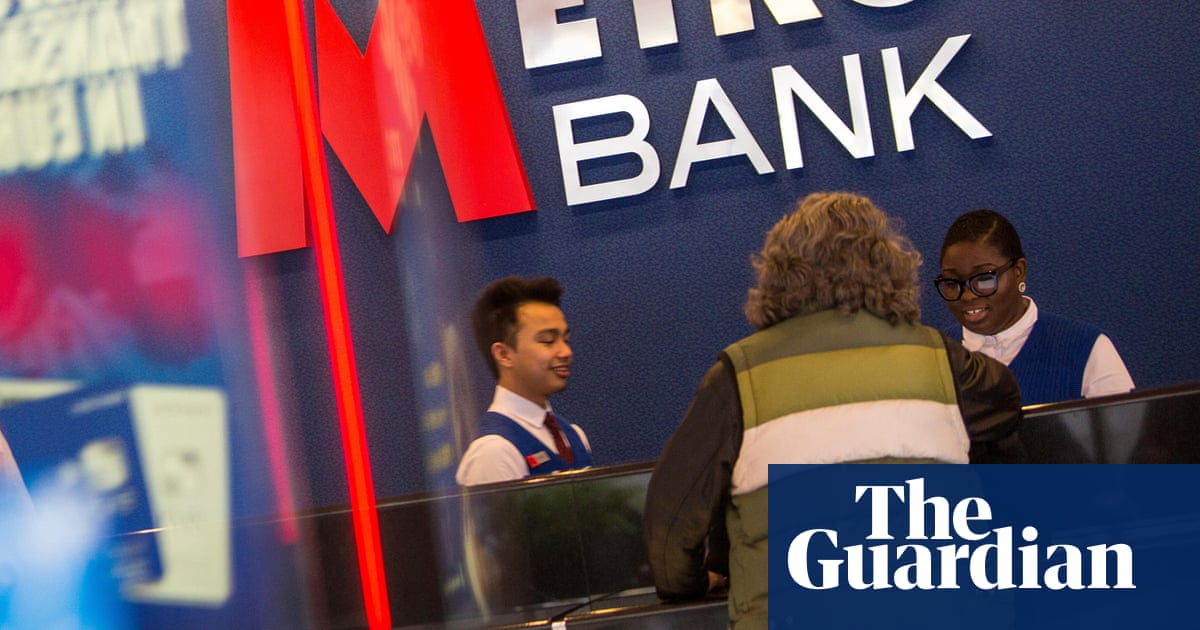Metro Bank is at risk of a shareholder backlash after two influential shareholder advisers warned about a complex bonus scheme that could hand the bank’s chief executive a £60m windfall.
ISS and Glass Lewis, prominent proxy advisory services that suggest how shareholders should vote on company policies at annual meetings, are concerned that the new long-term bonus will be linked to the bank’s share price, which may climb regardless of how well bosses run it.
The reports, published before Metro Bank’s annual shareholder meeting on 20 May, suggest it could lead to excessive, and potentially unwarranted, windfalls for bosses, including the chief executive, Daniel Frumkin.
Under the new plan, a bonus would be paid out after five years depending on how high the share price climbs over the long term.
Metro Bank’s share price currently sits at about 110p, and would have to climb above 120p in three years’ time for the bonus to kick in. A jump to 437p during that period could earn Frumkin a one-off payment of up to £60m.
That would be a major windfall for a chief executive, who last year earned a total of £1.15m, thanks in part to a £153k bonus.
Metro was the first high street bank to open in the UKin more than 100 yearswhen it was launched by the US billionaire Vernon Hill in 2010, attracted a wave of customers with dog-friendly branches and seven-day opening hours.
But the bank suffered in the years that followed. Itsshare price was all but wiped out in 2019after a devastating accounting error led to the resignation of it top executives and founder. It took a further dive in 2023 when it emerged the bank would need more cash from investors after it failed to convince regulators that Metro could be trusted to assess its own risks.
Metro was forced into the hands of the Colombian billionaire Jaime Gilinski Bacal as part of a £925m rescue deal in 2023, leading to a massive turnaround plan that has involvedmore than 1,000 job cutsand a decision to close branches on Sundays.
ISS said Metro Bank had “not put forward a convincing case” to support the new bonus plan, while Glass Lewis said it had “severe reservations about recommending shareholders support the remuneration policy at this time”.
“Participants may be eligible for extremely high payouts based largely on market forces,” Glass Lewis said. “We generally prefer that incentive awards reflect underlying performance measures that correlate to long-term growth, with appropriate limits.
“We recommend that shareholders vote against this proposal,” Glass Lewis added.
Sign up toBusiness Today
Get set for the working day – we'll point you to all the business news and analysis you need every morning
after newsletter promotion
Both proxy advisers recommended that shareholders reject a special resolution related to the new bonus scheme, as well as the wider remuneration policy. The remuneration policy, which is being overhauled outside the normal three-year cycle, also proposes a jump in annual bonuses that can now be worth up to 150% of salary, compared with 100% previously.
The proposed change is likely to be voted through, given the bank is now 53% owned by Bacal, who also sits on its board. However, it could still result in an embarrassing rebellion from remaining shareholders.
Metro Bank said in a statement: “The remuneration committee’s approach is based on the delivery of long-term growth generation and the continued turnaround of the bank. The proposed policy is fully aligned with shareholder’s interests and the creation of shareholder value over a sustained period.”
Metro has also been called out for falling short on gender diversity, as women account for just 27% of its board. That is shy of the 33% target set for the FTSE 350 firms in line with the Hampton-Alexander review and 40% targets set by the FTSE Women Leaders review. ISS said it had given “qualified support” for the Metro Bank chair, Robert Sharpe, as a result.
Metro Bank pointed to a comment from its annual report stating: “We recognise the benefits of having a balanced and diverse board which represents the views, experiences and backgrounds of our customers and colleagues. We are committed to increasing the diversity of our board over time and in line with our board succession plan.”
